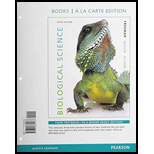
Concept explainers
Introduction:
All organisms behave and respond in different ways to various stimuli. This depicts their adaptive level and the success of their evolution. The behavior or cause of any organisms or an event can be explained in two ways on the basis of the mechanism (proximate) and on the basis of evolution (ultimate).
Answer to Problem 1TYK
Correct answer:
The proximate explanations of behavior focus on genetic, neurological, and hormonal mechanisms of behavior.
Explanation of Solution
Justification/Explanation for the correct answer:
Option (c) is given that the proximate theory relies on the genetic, neurological, and hormonal factors for the explanation of any behavior. This theory depends on the mechanisms that take place inside the body of the organism under study. Hence, option (c) is correct.
Explanation for the incorrect answers:
Option (a) is given that displays and other types of behavior change or evolve over time. The ultimate theory depends on the evolutionary process for explaining the behavior and displays of an organism. The behavioral patterns are justified on the basis of the evolution of the organism of interest with time. So, it is an incorrect option.
Option (b) is given that proximate theory relies on the “adaptive significance” of a behavior. Any behavior can be explained on the basis of natural selection and adaptation, but does not involve any physiological mechanisms of the body. So, it is an incorrect option.
Option (d) is given that proximate theory relies on appropriate experimental methods when studying the behavior of an organism. Experiments are also performed for studying the behavior of an organism. This is a one-time explanation for the current behavior of the organism of interest. This does not state whether such characteristics were possessed by the ancestors of the organism of interest or not. So, it is an incorrect option.
Hence, options (a), (b), and (d) are incorrect.
The proximate explanations of the behavior of the organisms depend on the genetic, neurological, and hormonal levels. This theory focuses on the internal body mechanisms of the organisms to explain the kind of behavior they show.
Want to see more full solutions like this?
Chapter 53 Solutions
Biological Science, (Looseleaf)-With Access
- Which of the following does not describe a function of aggressive animal behavior? A. Aggressive behavior leads to fights that allow strong animals kill off weaker members of the species. B. Aggressive behavior is displayed to establish hierarchy without violence. C. Aggressive behavior is displayed to establish territorial boundaries. D. Aggressive behavior is displayed to determine who is allowed to mate.arrow_forwardIdentify how studies of animals suggest that behavior canbe genetically based.arrow_forwardWhich research question does not refer to proximate causes of behavior? a.) How do rhesus macaques find their food? b.) how do pigeons that are experimentally displaced find their way back to their home loft? c.) How does dispersal affect the survival of Belding's ground squirrels? d.) Do mother goats learn the odor of their offspring? e.) How do hummingbirds “know” when it is time to return to their overwintering grounds?arrow_forward
- Explain the difference between innate and learned behavior using examples.arrow_forwardThe ability of rats to learn how to run a maze is an example of ________. a. imprinting b. classical conditioning c. operant conditioning d. cognitive learningarrow_forwardWhat will happen in long run if human do not differ from one another in behavior traits?arrow_forward
- Compare innate and learned behaviorarrow_forwardWhat is the importance of behavior in adapting animal populations to different and changing environments? can you answer this in atleast 300 wordsarrow_forwardDistinguish between proximate and ultimate causes of behavior and apply theconcepts of ultimate cause and cost–benefit analysis to decide whether a particularbehavior is adaptive.arrow_forward
- Training a dog to perform tricks using verbal commands and treats is an example ofa. nonassociative learning.b. operant conditioning.c. classical conditioning.d. imprinting.arrow_forwardWhy does an animal exhibit a particular behavior?arrow_forwardClassify each of the following descriptions as either a proximate or anultimate cause of behavior. For all proximate causes, speculate about apossible ultimate cause of the behavior. a. A surge of epinephrine initiates a flight response in a gazelle.b. Turtles use Earth’s magnetic field lines as guides during migration.c. A small mammal ignores low-energy food sources that are difficultto obtain, maximizing energy gain from foraging.d. A bird distracts a predator near its nest, increasing the nestlings’chance of survival.arrow_forward
 Biology (MindTap Course List)BiologyISBN:9781337392938Author:Eldra Solomon, Charles Martin, Diana W. Martin, Linda R. BergPublisher:Cengage Learning
Biology (MindTap Course List)BiologyISBN:9781337392938Author:Eldra Solomon, Charles Martin, Diana W. Martin, Linda R. BergPublisher:Cengage Learning Human Heredity: Principles and Issues (MindTap Co...BiologyISBN:9781305251052Author:Michael CummingsPublisher:Cengage Learning
Human Heredity: Principles and Issues (MindTap Co...BiologyISBN:9781305251052Author:Michael CummingsPublisher:Cengage Learning Comprehensive Medical Assisting: Administrative a...NursingISBN:9781305964792Author:Wilburta Q. Lindh, Carol D. Tamparo, Barbara M. Dahl, Julie Morris, Cindy CorreaPublisher:Cengage Learning
Comprehensive Medical Assisting: Administrative a...NursingISBN:9781305964792Author:Wilburta Q. Lindh, Carol D. Tamparo, Barbara M. Dahl, Julie Morris, Cindy CorreaPublisher:Cengage Learning Biology: The Dynamic Science (MindTap Course List)BiologyISBN:9781305389892Author:Peter J. Russell, Paul E. Hertz, Beverly McMillanPublisher:Cengage Learning
Biology: The Dynamic Science (MindTap Course List)BiologyISBN:9781305389892Author:Peter J. Russell, Paul E. Hertz, Beverly McMillanPublisher:Cengage Learning




